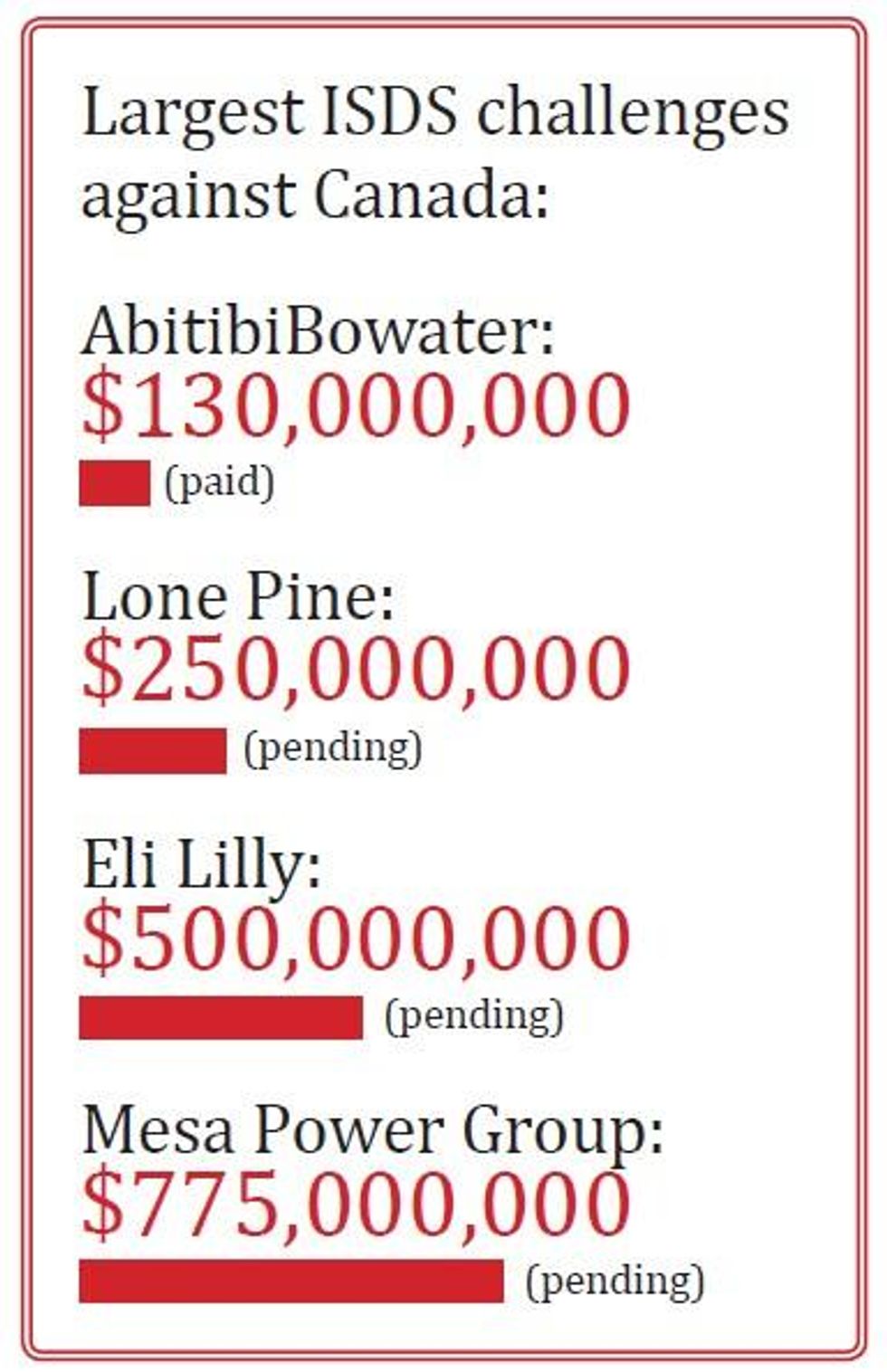NAFTA, the free trade agreement between Canada, the USA, and Mexico that went into effect in 1994, was the first trade agreement among developed countries to include an investor-state provision (ISDS). This provision grants investors on the continent the right to sue one another's governments without first pursuing legal action through the country's legal system. Before NAFTA, ISDS provisions were only negotiated between developed and undeveloped countries.
As a result of NAFTA's ISDS challenges, Canada is now the most sued developed country in the world. Canada has been sued more times than either the U.S. or Mexico. Of the 77 known NAFTA investor-state claims, 35 have been against Canada, 22 have targeted Mexico and 20 have targeted the US. The US government has won 11 of its cases and never lost a NAFTA investor-state case or paid any compensation to Canadian or Mexican companies.
This is evidence that even though trade agreements appear to treat all parties equally, the more powerful countries are usually more immune to trade challenges.
Canada has paid American corporations more than $200 million (approximately EUR135 million) in the seven cases it has lost and foreign investors are now seeking over $6 billion (approximately EUR4 billion) from the Canadian government in new cases. Even defending cases that may not be successful is expensive. Canada has spent over $65 million (approximately EUR45 million) defending itself from NAFTA challenges.
The Canadian Centre for Policy Alternatives reports that almost two-thirds of claims against Canada involved environmental protection or resources management challenges that allegedly interfered with American corporations' profit.
Cases include:
- Ethyl, a U.S. chemical corporation, successfully challenged a Canadian ban on imports of its gasoline that contained MMT, an additive that is a suspected neurotoxin. The Canadian government repealed the ban and paid the company $13 million (approximately EUR8.8 million) for its loss of revenue.
- S.D. Myers, a U.S. waste disposal firm, challenged a similar ban on the export of toxic PCB waste. Canada paid the company over $6 million (approximately EUR4 million).
- A NAFTA panel ordered the Canadian government to pay Exxon-Mobil, the world's largest oil and gas company, $17.3 million (approximately EUR11.6 million) when the company challenged government guidelines that investors in offshore exploration in the province of Newfoundland and Labrador - where the company is heavily involved - must invest in local research and development.
- New Jersey-based Bilcon Construction is demanding $300,000 (approximately EUR200,000) in damages from the Canadian government after winning a NAFTA challenge when its plan to build a massive quarry and marine terminal in an environmentally sensitive area of Nova Scotia and ship basalt aggregate through the Bay of Fundy, site of the highest tides in the world, was rejected by an environmental assessment panel.
- Chemical giant Dow AgroSciences used NAFTA to force the province of Quebec, after it banned 2,4-D, a pesticide that the Natural Resources Defence Council says has been linked in many studies to cancer and cell damage, to publicly acknowledge that the chemical does not pose an "unacceptable risk" to human health, a position the government had previously held.
- The Canadian government paid American pulp and paper giant AbitibiBowater $130 million (approximately EUR88 million) after the company successfully used NAFTA to claim compensation for the "water and timber rights" it left behind when it abandoned its operations in the province of Newfoundland and Labrador after 100 years, leaving the workers with unpaid pensions. This challenge is particularly disturbing because it gives a foreign investor the right to claim compensation for the actual resources it used while operating in another jurisdiction.
- Mesa Power Group, an energy company owned by Texas billionaire T. Boone Pickens, is claiming $775 million (approximately EUR523 million) in a challenge to the province of Ontario's Green Energy Act, which gives preferential access to local wind farm operators.
- Lone Pine, a Canadian energy company, is suing the Canadian government through its American affiliate for $250 million (approximately EUR152 million) because the province of Quebec introduced a temporary moratorium on all fracking activities under the St. Lawrence River until further studies are completed. This challenge is concerning because it involves a domestic company using a foreign subsidiary to sue its own government.
- Eli Lilly, a U.S. pharmaceutical giant, is suing Canada for $500 million (approximately EUR337 million) after three levels of courts in Canada denied it a patent extension on one of its products. This case is particularly disturbing because it challenges Canadian laws as interpreted by Canadian courts and represents a new frontier for ISDS challenges
These, and other examples show that trade and investment agreements such as NAFTA give transnational corporations incredible new rights to impose their will on governments. But they are probably just the tip of the iceberg because many new laws or changes to laws never come to light because of the "chill effect" of prior restraint. The Canadian government adopted a new policy soon after NAFTA was adopted whereby all new laws and any changes to existing laws have to be vetted by trade experts to ensure they are not challengeable under ISDS rules.


